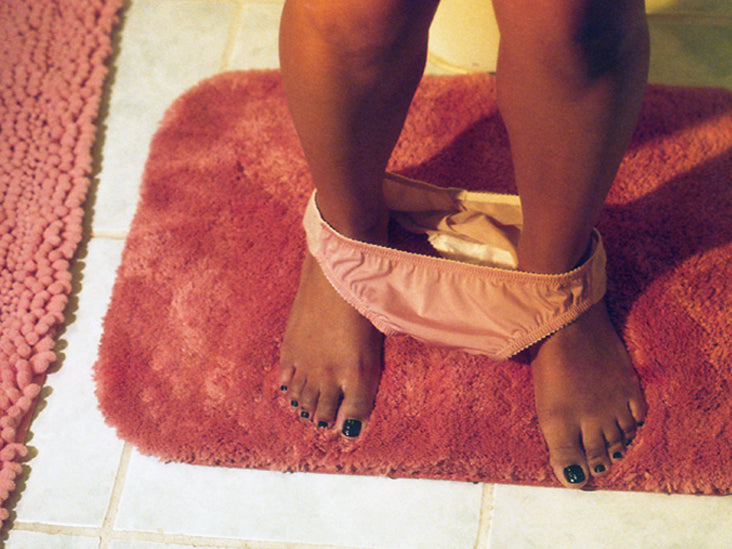What is Spotting Between Periods?

You might have heard of spotting or experienced light bleeding between periods and wondered why it happens and what it means. The majority of people with periods will experience spotting so we're here to break down exactly what spotting is, and how, when and why it happens.
What is spotting?
'Spotting' has an official name for it — intermenstrual bleeding (also formerly known as metrorrhagia). This is a light vaginal bleeding that happens during your cycle outside the time you have your regular period. Spotting is the losing of a very slight amount of blood that you may only just notice on your underwear or on tissue after wiping, as slight "spots" of blood. The amount of blood that is lost when spotting varies between different people — for some people, the spotting may be so light that it does not even show through the other side of your undies, whilst for others it may be heavier.
What is the difference between spotting and periods?
There are some key differences between spotting and menstrual bleeding. Here are some ways to determine which you are experiencing:
- Regularity: Menstrual bleeding is considered regular and mostly will occur month to month. Unlike menstrual bleeding, spotting is usually irregular and can be quite sporadic. For example, you might start spotting, have a day with no bleeding, then start again.
- Colour: Period bleeding is usually red in colour, which can help tell it apart from spotting, which many people experience as a brown colour and also a different texture to period blood.
- Symptoms: In the days leading up to your period, common symptoms include things like period cramps, breast tenderness and headaches. When spotting, you will usually not experience these symptoms along side it.
You might ask yourself 'why am I spotting?’
We’ve listed 5 reasons you may have period spotting.
1) Hormonal contraception or intra-devices for birth control can cause spotting.
Hormonal methods of contraception can cause spotting and switching between birth control methods can also often affect spotting while the body adjusts to different levels of hormones. Spotting is a common side effect of hormonal contraception, especially during the first few months of starting a new method.
The most common type of birth control is the combined oral contraceptive pill. When using this type of birth control, it is very common for spotting to happen for the first couple of months. If spotting continues after a few months, your pill may not be the best fit for you and you might want to try another type of pill. Forgetting to take your pill can also cause spotting as your hormonal levels will drop. As always, our bodies are all different and this is something that can be discussed with your GP.
Spotting is also common and often unpredictable with the hormonal IUD, the contraceptive implant, and the contraceptive shot or injection.
It's also important to note that when stopping any form of contraception, this can also effect bleeding and cause spotting, as the hormones will imbalance whilst the body readjusts.
2) Spotting can be due to ovulation and/or hormonal fluctuation.
Ten percent of people who menstruate will experience period spotting due to a slight drop in estrogen levels. The estrogen levels drop slightly mid-cycle around the time the ovary releases an egg. This fluctuation of the estrogen hormone can can result in a slight bleed — spotting.
3) A first ever menstruation or coming to the end of menstruation (perimenopause)
First ever menstruation
For many teens, their first ever menstruation will just be a light spotting. The body can take some time adjusting to this new influx of hormones and the settling can reuslt in spotting mid-cycle. This time of puberty is a major new change to the body and the actual period may be so light it looks like spotting. There may also be spotting in between the cycle and generally the body can take some time whilst a pattern is established.
There are many very informative books and ebooks available which can help with the understanding periods and puberty. For people starting their first period, a good read we'd recommend is PERIOD, written and illustrated by Natalie Byrne. PERIOD is a book specifically aimed at younger people starting their first period and offers a wealth of knowledge in an easy to understand way (FYI, you can also find FLUX Undies in the book!).
Coming to the end of periods (perimenopause)
Reaching menopause has a stage that starts before — this is called perimenopause. Perimenopause is a time when the body is once again going through extreme fluctuations hormonally which often results in spotting in between periods. The perimenopausal phase can last a number of years, with periods also becoming irregular, but as long as you are still having any periods you know you have still not reached the menopause. It's always a good idea to mention any irregular bleeding within perimenopause and menopause to your GP or local health provider as a precaution, but spotting is common in these stages and are usually just part of the menstrual journey.
4) You are breast feeding, pregnant or have recently been pregnant
5) Feeling stressed out
Stress is often overlooked but it plays a big part in how our body works! If you are suffering with stress it can effect just about every part of your life and the reproductive system is no exception.
When you're stressed, adrenaline and cortisol is released into your body which can result in a hormonal imbalance, causing irregular bleeding like spotting. Other symptoms of being stressed, such as over eating, under eating, and insomnia can all effect the msntrual cycle and cause irregular bleeding and period spotting.
Trying to reduce your stress levels is something that will help your body and mind. If you're feeling stressed out, things like exercise, yoga and meditation are all known to help reduce stress levels.
Wrapping it up
So now you know what spotting is and the most common causes of spotting between periods. Spotting is common and usually not a cause for any concern, but be sure to find further information from well-trusted sources like the NHS or speak with your GP or local health provider if you have any concerns.
Whilst you're here, if spotting is an issue for you, why not try our leak-proof period pants? We offer leak-proof underwear that is ultra-thin and breathable, great for absorbing light leaks or light spotting between periods so you can feel confident that you're free from leaks and stains whilst spotting.




